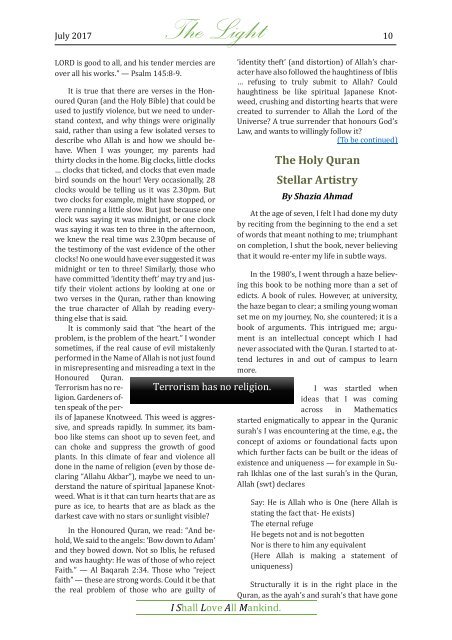2017 07 The Light July 2017
Create successful ePaper yourself
Turn your PDF publications into a flip-book with our unique Google optimized e-Paper software.
<strong>July</strong> <strong>2017</strong> <strong>The</strong><br />
<strong>Light</strong> 10<br />
LORD is good to all, and his tender mercies are<br />
over all his works.” — Psalm 145:8-9.<br />
It is true that there are verses in the Honoured<br />
Quran (and the Holy Bible) that could be<br />
used to justify violence, but we need to understand<br />
context, and why things were originally<br />
said, rather than using a few isolated verses to<br />
describe who Allah is and how we should behave.<br />
When I was younger, my parents had<br />
thirty clocks in the home. Big clocks, little clocks<br />
… clocks that ticked, and clocks that even made<br />
bird sounds on the hour! Very occasionally, 28<br />
clocks would be telling us it was 2.30pm. But<br />
two clocks for example, might have stopped, or<br />
were running a little slow. But just because one<br />
clock was saying it was midnight, or one clock<br />
was saying it was ten to three in the afternoon,<br />
we knew the real time was 2.30pm because of<br />
the testimony of the vast evidence of the other<br />
clocks! No one would have ever suggested it was<br />
midnight or ten to three! Similarly, those who<br />
have committed ‘identity theft’ may try and justify<br />
their violent actions by looking at one or<br />
two verses in the Quran, rather than knowing<br />
the true character of Allah by reading everything<br />
else that is said.<br />
It is commonly said that “the heart of the<br />
problem, is the problem of the heart.” I wonder<br />
sometimes, if the real cause of evil mistakenly<br />
performed in the Name of Allah is not just found<br />
in misrepresenting and misreading a text in the<br />
Honoured Quran.<br />
Terrorism has no religion.<br />
Gardeners often<br />
speak of the perils<br />
of Japanese Knotweed. This weed is aggressive,<br />
and spreads rapidly. In summer, its bamboo<br />
like stems can shoot up to seven feet, and<br />
can choke and suppress the growth of good<br />
plants. In this climate of fear and violence all<br />
done in the name of religion (even by those declaring<br />
“Allahu Akbar”), maybe we need to understand<br />
the nature of spiritual Japanese Knotweed.<br />
What is it that can turn hearts that are as<br />
pure as ice, to hearts that are as black as the<br />
darkest cave with no stars or sunlight visible?<br />
Terrorism has no religion.<br />
In the Honoured Quran, we read: “And behold,<br />
We said to the angels: ‘Bow down to Adam’<br />
and they bowed down. Not so Iblis, he refused<br />
and was haughty: He was of those of who reject<br />
Faith.” — Al Baqarah 2:34. Those who “reject<br />
faith” — these are strong words. Could it be that<br />
the real problem of those who are guilty of<br />
I Shall Love All Mankind.<br />
‘identity theft’ (and distortion) of Allah’s character<br />
have also followed the haughtiness of Iblis<br />
… refusing to truly submit to Allah? Could<br />
haughtiness be like spiritual Japanese Knotweed,<br />
crushing and distorting hearts that were<br />
created to surrender to Allah the Lord of the<br />
Universe? A true surrender that honours God’s<br />
Law, and wants to willingly follow it?<br />
(To be continued)<br />
<strong>The</strong> Holy Quran<br />
Stellar Artistry<br />
By Shazia Ahmad<br />
At the age of seven, I felt I had done my duty<br />
by reciting from the beginning to the end a set<br />
of words that meant nothing to me; triumphant<br />
on completion, I shut the book, never believing<br />
that it would re-enter my life in subtle ways.<br />
In the 1980’s, I went through a haze believing<br />
this book to be nothing more than a set of<br />
edicts. A book of rules. However, at university,<br />
the haze began to clear; a smiling young woman<br />
set me on my journey, No, she countered; it is a<br />
book of arguments. This intrigued me; argument<br />
is an intellectual concept which I had<br />
never associated with the Quran. I started to attend<br />
lectures in and out of campus to learn<br />
more.<br />
I was startled when<br />
ideas that I was coming<br />
across in Mathematics<br />
started enigmatically to appear in the Quranic<br />
surah’s I was encountering at the time, e.g., the<br />
concept of axioms or foundational facts upon<br />
which further facts can be built or the ideas of<br />
existence and uniqueness — for example in Surah<br />
Ikhlas one of the last surah’s in the Quran,<br />
Allah (swt) declares<br />
Say: He is Allah who is One (here Allah is<br />
stating the fact that- He exists)<br />
<strong>The</strong> eternal refuge<br />
He begets not and is not begotten<br />
Nor is there to him any equivalent<br />
(Here Allah is making a statement of<br />
uniqueness)<br />
Structurally it is in the right place in the<br />
Quran, as the ayah’s and surah’s that have gone














